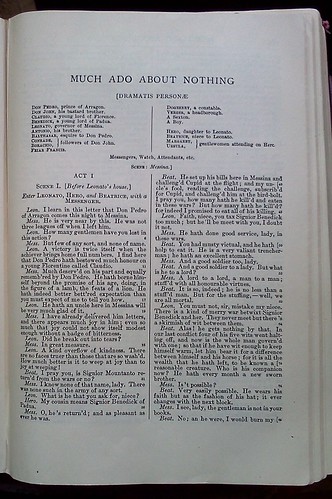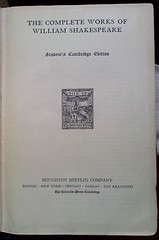Me? Well, it really depended upon what life was like. Some years, I finished 12 books with time to spare. Other years, I barely made it through 4, let alone 10. They had to be age appropriate, too. I couldn't fill my paper with "The Very Hungry Caterpillar", etc, and call it done.
I have gone through a period where my reading has been pretty much confined to magazines and the instruction sheets that go with craft projects. I'm not sure why but I'm drawn to the stack this summer. It could be that's because there is an adaptation of Shakespeare coming to movie theatres this Friday.
"Much Ado About Nothing" is not one of Shakespeare's finest. I hadn't read this play since probably college, so I dug out my Complete Shakespeare and dove in.
This is a frothy tale employing one of Shakespeare's favorite comedic conceits, the masquerade wherein people claim to be whom they are not and the repercussions of this action. The hero and heroine of the story, Claudio and, aptly named, Hero, meet and Claudio falls madly in love with her on sight. She is wooed by Claudio's boss, Don Pedro, and she agrees to marry Claudio. The villain, an illegitimate brother to Claudio's boss decides to break them up and has his henchmen stage a rendevous with Hero's maid at night while Claudio overhears from a nearby orchard. Thinking Hero has just agreed to meet with another man, he publicly humiliates her the next day, at their wedding. Hero faints and several people agree to tell Claudio that she has died, while the local constabulary accidentally arrest the conspirators and elicit a confession. The final act sees all this madness come to resolution and Claudio and Hero happily together about to be married. The whole of this happens under the auspices of a large party to welcome Don Pedro back from an unspecified successful military campaign.
There are problems with the play. The action takes place over 3 days. Truncating the action like that leads to a great need on behalf of the audience to suspend disbelief and agree that things can happen this quickly. Even "Hamlet" is allowed to play out over several months. "As You Like It", which employs a similar 'people not who they say they are' concept, gives the characters some time to get to know one another. The villain, Don John, is given little motive for doing what he does. He's mentioned as being illegitmate, but in stronger plays, that means someone's been cheated out of an inheritance or ostracized from court. This guy seems to want to be mean just because he can. That's never a very deep well of motivation for a villain. Also, he escapes the police, who have his accomplices, and the movie ends with the announcement that he's sent his army to attack his brother.
The best lines in the play are not from the two lovers. The leads in the play are Beatrice and Bernardo and much of the richness of language, the humor and the resolution of the plots many strings comes from their banter. We meet them before we meet Claudio and Hero and, from the early language understand they have had a long relationship marked by verbal swordplay. Their exchanges are some of the best written lines in this play. The fact that they use their verbal sparring to keep each other at bay when it's clear they love each other is quite amusing. When they come together at the end, accepting that love, it is, I think, a much bigger thrill than Hero being revealed as alive and Claudio finding out he was duped.
The title of the play references all the little twists and turns contained in it. When it comes to love, the bumps and pot holes to get from meeting to marriage are not important, much ado about nothing. True love finds a way. We might have to help it along, but even left to its own devices, it will find a way.
I'm excited to see this adapted for the movies. Will Joss Whedon, director, carry this through? Will he keep the banter between Beatrice and Bernardo at the intensity it is in the original? Will he flesh out Don John and give him more of a reason to be a villain? Will the audience get half of what's going on or will they simply come to see Nathan Fillion call himself an 'ass'? I suppose there are worse ways to get people to hear the words of Shakespeare.
Reading Shakespeare caused me to think about an author I don't think I've read since college. There has been a long, long, long running discussion; in some places of academia, an argument; that the man, William Shakespeare, did not write the plays attributed to him. The one piece of "evidence" used to frame this discussion is that the man called Shakespeare was not educated enough to create such astounding works, to create over 5,000 words which were added to the lexicon. It is known that he was in the theatre but he was just a would-be writer and just didn't have the smarts or social standing to write these intricate works. One of the people associated with this conspiracy is Christopher Marlowe.
Marlowe died in 1593, well before Shakespeare's plays were considered for the stage or before some of them had been written. Some of the conspiracy theorists have Shakespeare killing Marlow and stealing his compositions, affixing his name to them. The two were contemporaries although there is no evidence they ever met. It is known that Shakespeare knew of and read Marlowe's plays and was influenced by his style.
 I'm not sure why the association popped into my head, but as I was planning to read Much Ado, I thought of Marlowe and his play "Doctor Faustus". It's based on historical information from Wittenberg, Martin Luther's home town, about a theology student who sold his soul to the devil in exchange for riches. Supposedly this happened shortly after Luther nailed his 95 Theses to the door of the cathedral. This story was "all the rage" with the court and Marlowe tapped into that.
I'm not sure why the association popped into my head, but as I was planning to read Much Ado, I thought of Marlowe and his play "Doctor Faustus". It's based on historical information from Wittenberg, Martin Luther's home town, about a theology student who sold his soul to the devil in exchange for riches. Supposedly this happened shortly after Luther nailed his 95 Theses to the door of the cathedral. This story was "all the rage" with the court and Marlowe tapped into that.So, I hauled out my big red British Literature book Volume 1 and opened it up to "Doctor Faustus". The premise is simple. A theologian takes up the offer of two others to learn magic and conjures Mephistopheles who says he cannot be the man's servant unless the man sells his soul to Lucifer. There is an on-going dialog between good and evil angels and a final ending wherein either the theologian outwits Lucifer or Lucifer claims the soul. Honestly, I don't remember if this was written as a cautionary tale, lest someone be tempted towards the 'dark arts', or an uplifting story of redemption. It's long, much longer than one of Shakespeare's plays and does require a bit more out of a reader. I reached Act II Scene II yesterday before closing the book to finish chores.
The theatre starts my summer reading. Where it goes from here is going to be a surprise to me. I shall let my eyes pick the next books; there's merit in buying a book because it looks good; and we'll see. What are you reading this summer?
Beverage: Berry-flavored Seltzer
deb



No comments:
Post a Comment